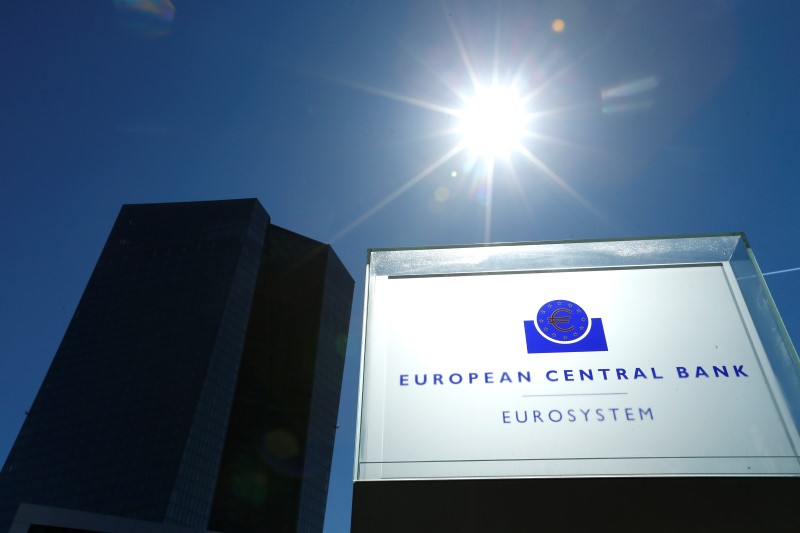By Francesco Canepa and Balazs Koranyi
VIENNA/FRANKFURT (Reuters) - Keeping interest rates firmly on hold, the European Central Bank will likely raise growth and inflation forecasts on Thursday, a rare positive step even as it emphasises persistent negative risks and a readiness to provide more stimulus.
The ECB is buying assets to the tune of 1.74 trillion euros ($1.94 trillion) to lift growth and boost inflation, which has been stuck in negative territory for months, raising the risk the 19-member currency bloc sinks into a deflation spiral.
With oil prices almost doubling since early January, the ECB will nudge up its inflation projections, breaking a cycle of having to cut forecasts quarter after quarter, and supporting ECB President Mario Draghi's call for patience with measures already taken.
Indeed, corporate bond buys, announced in March, will only start in June, and the first allotment of ultra cheap loans is not due until later this month, indicating that more stimulus is already in the pipeline and supporting an argument by some policymakers for the ECB to stay on the sidelines at least until autumn.
Meeting in Vienna, the ECB will announce its rate decision at 1145 before Draghi's news conference at 1230 GMT. All 65 analysts polled by Reuters expect rates to stay unchanged and the vast majority see them on hold for the rest of the year.
Besides new economic forecasts, Draghi is also likely to provide more detail on the bank's corporate bond buying plans and discuss how Greek banks could regain access to ordinary ECB funding after more than a year on an expensive emergency lifeline.
"Although the expected (inflation forecast) adjustment is modest, it may help put a floor under inflation expectations and allow the ECB to remain in a wait-and-see mode while its latest measures work their way through the economy," Unicredit (MI:CRDI) economist Marco Valli said. "The revision is likely to be entirely energy-driven."
Although the ECB will maintain its guidance that rates will stay at their current or lower levels for an extended period, Draghi may repeat his view that he does not foresee another rate cut.
Inflation has missed the ECB's target of nearly 2 percent for years as high unemployment keeps a lid on wages, high debt levels choke investment, demand for goods and services remains weak and sharply lower oil prices drag down prices.
But with first quarter growth beating all expectations, economic sentiment rising, investments recording a surprising surge and household consumption holding up, the euro zone economy is on its best run since the global financial crisis.
Even if only few see it as sustainable, most economists expect growth to ease back just slightly, toward a path consistent with the ECB's expectation for modest but increasingly broad-based expansion.
CORE TROUBLE?
Yet, the news regarding inflation is not all positive.
Higher oil prices may lift headline prices, but the underlying trend remains weak and the ECB may even cut its forecast for core inflation, which excluded food and fuel.
"The core inflation forecast will in our view be revised lower over the entire forecast horizon," Danske Bank economist Pernille Bomholdt Henneberg said.
"The ECB argues that core inflation will rise as the labour market improves, but we believe wage pressure will stay modest for some time due to labour market slack, while the stronger effective euro will also be a headwind."
Indeed, the euro zone five-year, five-year breakeven forward, a market-based long-term inflation projection, is hovering just below 1.5 percent, indicating little market confidence the ECB can meet its target in the coming years.
Peter Praet, the ECB's chief economist, has also warned that inflation expectations may be de-anchoring, which would suggest euro zone companies and consumers are losing faith in the ECB's ability to raise inflation.
Any core inflation cut would not trigger fresh ECB measures on Thursday but raises the likelihood that the ECB will eventually extend its asset buying scheme, which is set to run at least until March 2017.
"Our expectation is that the QE programme will be extended to the end of 2017 and we think that an announcement could be made in September," JPMorgan (NYSE:JPM) economist Greg Fuzesi said.
"The medium-term inflation forecast remains low-ish, which creates the risk of an unanchoring of inflation expectations," Fuzesi said. "Ending quantitative easing in March would also cause an unwanted tightening in financial conditions."
